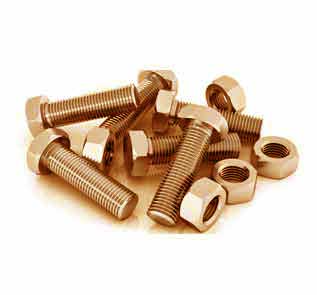
Choosing the right bolts and nuts for a project can be a daunting task, especially with the variety of materials available in the market. One of the most popular choices is brass, known for its strength, corrosion resistance, and aesthetic appeal. In this blog, we will guide you on how to choose the right brass bolts and nuts for your project, ensuring that you make the best choice for both functionality and durability.
Note:- Ensure the success and longevity of your project by choosing the best Brass Bolts and Nuts available. Don’t settle for less—click here to explore our wide selection of high-quality brass fasteners and find the perfect fit for your needs. Start your project with confidence and order today!
Why Choose Brass Bolts and Nuts?
Benefits of Brass
Brass is an alloy made from copper and zinc, offering several benefits:
- Corrosion Resistance: Brass bolts and nuts are highly resistant to corrosion, making them ideal for use in environments exposed to moisture.
- Aesthetic Appeal: Brass has a golden-yellow color that adds an elegant touch to any project.
- Strength and Durability: While not as strong as steel, brass offers sufficient strength for many applications, along with excellent durability.
Common Uses of Brass Bolts and Nuts
Brass bolts and nuts are commonly used in:
- Plumbing: Due to their corrosion resistance, brass fittings are perfect for plumbing applications.
- Electrical Work: Brass’s non-magnetic properties make it suitable for electrical connections.
- Marine Applications: The resistance to saltwater corrosion makes brass an excellent choice for marine projects.
Factors to Consider When Choosing Brass Bolts and Nuts
Understanding Bolt and Nut Sizes
Choosing the right size is crucial for the success of your project. Here are key considerations:
- Thread Size: Ensure that the bolt and nut have matching thread sizes.
- Length: The bolt length should be sufficient to go through the material and allow the nut to be securely fastened.
- Diameter: The diameter should match the holes in the materials being joined.
Grade of Brass
Brass comes in different grades, each with unique properties:
- C360: Known as free-machining brass, it’s excellent for machining and threading.
- C377: Ideal for forging, this grade is commonly used in fittings and valves.
- C464: Also known as naval brass, it offers superior corrosion resistance, making it perfect for marine applications.
Application-Specific Considerations
Environmental Factors
Consider the environment where the bolts and nuts will be used:
- Moisture Exposure: For high moisture environments, choose brass with excellent corrosion resistance.
- Temperature: Brass performs well in a range of temperatures but may not be suitable for extremely high temperatures.
Load and Stress
Understand the load and stress requirements of your project:
- Static Loads: Brass is suitable for static loads but may not be ideal for high-stress applications.
- Dynamic Loads: For applications with dynamic loads, consider the strength and durability required.
Installation Tips for Brass Bolts and Nuts
Proper Tools and Techniques

Using the right tools and techniques ensures the best results:
- Wrenches and Sockets: Use appropriate sizes to avoid damaging the brass.
- Torque Settings: Apply the correct torque to prevent over-tightening and potential damage.
Preventing Galling
Galling is a form of wear caused by adhesion between sliding surfaces:
- Lubrication: Use lubricants to reduce friction and prevent galling.
- Proper Alignment: Ensure proper alignment during installation to reduce the risk of galling.
Maintenance and Longevity
Regular Inspections
Regular inspections help in maintaining the integrity of brass bolts and nuts:
- Check for Corrosion: Despite their resistance, inspect for any signs of corrosion.
- Tightness: Periodically check and retighten bolts and nuts if necessary.
Cleaning and Care
Proper cleaning and care extend the life of brass fasteners:
- Mild Cleaners: Use mild cleaners to avoid damaging the brass.
- Avoid Abrasives: Avoid abrasive materials that can scratch the surface.
Comparing Brass with Other Materials
Brass vs. Stainless Steel
When comparing brass to stainless steel, consider the following:
- Corrosion Resistance: Both materials offer good corrosion resistance, but brass performs better in marine environments.
- Strength: Stainless steel is stronger, making it better for high-stress applications.
- Aesthetic Appeal: Brass has a unique golden color, while stainless steel has a sleek, modern look.
Brass vs. Aluminum
Comparing brass to aluminum:
- Weight: Aluminum is lighter, making it ideal for projects where weight is a concern.
- Corrosion Resistance: Brass is more resistant to corrosion compared to aluminum.
- Cost: Aluminum is generally less expensive than brass.
Practical Examples of Brass Bolts and Nuts Use
Plumbing Projects
In plumbing, brass bolts and nuts are commonly used for:
- Pipe Connections: Their corrosion resistance ensures long-lasting connections.
- Valve Assemblies: Brass is ideal for valves due to its durability and resistance to corrosion.
Marine Applications
In marine settings, brass fasteners are used for:
- Boat Fittings: Brass’s resistance to saltwater corrosion makes it perfect for boat fittings.
- Dock Hardware: Brass hardware is often used in docks and piers for its longevity.
Electrical Installations
In electrical installations, brass bolts and nuts are chosen for:
- Circuit Connections: Brass’s non-magnetic properties make it suitable for electrical circuits.
- Grounding Applications: Brass is used in grounding applications due to its conductivity.
Conclusion
Choosing the right brass bolts and nuts for your project involves understanding the specific requirements of your application and the properties of brass. By considering factors such as size, grade, environmental conditions, and load requirements, you can ensure that you select the best fasteners for the job. With proper installation and maintenance, brass bolts and nuts can provide reliable performance and longevity, making them a valuable choice for a wide range of projects. Whether you are working on plumbing, marine, or electrical applications, brass fasteners offer a combination of durability, corrosion resistance, and aesthetic appeal that makes them an excellent choice.
Read more informative blog at Bizbuildboom.